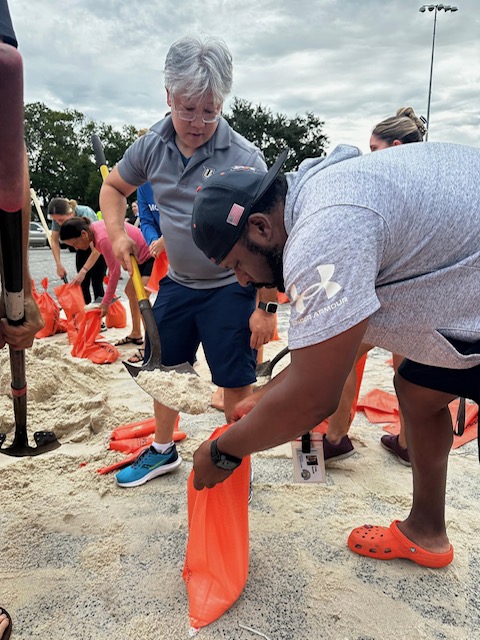
by Beth Kassab | Oct 17, 2024 | City Commission, News, Uncategorized
Winter Park closes in on major CRA expansion, celebrates wins from Hurricane Milton
The CRA is expected to help fund stormwater projects that became a high priority after Hurricane Ian in 2022.The impacts felt by Hurricane Milton were less severe
Oct. 17, 2024
(Photo caption: Commissioners Craig Russell and Kris Cruzada assist residents with sandbags before Hurricane Milton made landfall last week. Courtesy of the city of Winter Park.)
By Beth Kassab
Winter Park officials on Thursday celebrated relatively few power outages and far more contained flooding that occurred after Hurricane Milton compared with Hurricane Ian two years earlier as they also took steps to finalize a major expansion of the city’s Community Redevelopment Agency.
The CRA expansion will help pay for a number of projects within its boundaries that cover downtown from Interlachen Boulevard to roughly U.S. 17-92 and — if the new borders get approval from neighboring Orlando and Orange County — Fairbanks Avenue to Interstate 4.
The two-year process to expand the CRA and extend its sunset date from 2027 to 2037 coincided with the time Winter Park also contended with the fallout from Hurricane Ian, which raked through Central Florida on Sept. 29, 2022 caused the worst inland flooding in modern memory. The storm dropped 13 inches of rain, according to the tally from Orlando International Airport.
Milton brought heavy rains, too, but the Winter Park total is estimated in the 5 to 6-inch range, according to Gloria Eby, the city’s director of Natural Resources & Sustainability.

The proposed CRA expansion.
Less rain combined with actions the city vowed to take ahead of the next big storm led to fewer problems overall.
Mayor Sheila DeCiccio commended the city staff for “a truly outstanding job,” noting “everything I have been to — people are in awe of the city of Winter Park.”
City Manager Randy Knight said “a lot of improvements have been made since Ian.”
As a result, there were no reports of flooding inside homes this time and most Winter Park residents had power from the city-owned electric utility throughout the storm. At peak outage, 275 customers were without power, according to the city.
“The electric utility knocked it out of the park,” Knight said, crediting the city’s long-standing efforts to underground all of the city’s power lines, which is about 80% complete.
“It took courage 20 years ago when this commission decided to buy the utility,” he said. “Every commission since then has kept [the undergrounding project] in the budget … and we’re seeing the benefits today.”
Storms like Ian and Milton, though, brought far more rain than wind to the city. And that causes more issues with flooding versus trees downing power lines.
As a result, the commission has focused on studying stormwater projects. In fact, a meeting for commissioners to discuss the results of water basin studies was postponed twice in recent weeks — once for Hurricane Helene and then again for Milton. The meeting is now set to take place next week.
DeCiccio said Thursday that the additional money from the CRA expansion would help, in part, with drainage issues that fall within the agency’s boundaries. Orlando and Orange County are set to take up their ends of the agreement before the end of the month and, if approved, the CRA expansion would mean an additional $57 million in tax revenue that would remain in Winter Park rather than going to the county.
The city took measures to avoid flooding ahead of Milton such as opening lake drains or adjusting weirs to improve water flow where possible.
But more is needed. For example, before Milton landed city workers drained the pond at MLK Park near the library, but some streets still flooded nearby, though no water was reported inside homes this time around.
WinterParkVoiceEditor@gmail.com
To comment or read comments from others, click here →

by Beth Kassab | Oct 3, 2024 | City Commission, News, Taxes, Uncategorized
Winter Park Playhouse, Rollins come out as winners in TDT recommendations
They are among 11 arts and culture projects that the Tourist Development Tax board is asking the County Commission to fund
Oct. 3, 2024
By Beth Kassab
The Winter Park Playhouse and the Rollins Art Museum are on track to receive their full request for dollars from a portion of Tourist Development Tax money set aside for arts and cultural projects over the next five years.
The playhouse project, through a partnership with the city of Winter Park to purchase and renovate its current building after nearly losing its lease, will receive $8 million between now and 2028 if the recommendations from the Tourist Development Tax Advisory Council are approved by the Orange County Commission later this month.
The Rollins Art Museum, which made a bid to take over the old Winter Park Library but was pushed aside for the Blue Bamboo Center for the Arts, will receive $10 million between 2026 and 2028, according to the recommendations.
The college announced this week that museum leader Ena Heller is leaving to take a position as the next director of the Boca Raton Museum of Art, but President Grant Cornwell told the Voice in a statement that the vision for a new museum will continue with a broad base of support.
“It has been an honor to work alongside Ena, whose visionary leadership has transformed the Rollins Museum of Art into an integral part of the College’s mission,” Cornwell said. “I am deeply grateful for her contributions and creativity and for ensuring the museum’s successful standing as we build upon the foundation she is leaving. The museum has strong support and a vital group of members, donors, partners, and patrons supporting it, and we are excited about this next stage as we come to closure on our future museum.”
The County Commission will take up the funding requests for final approval on Oct. 29.
Earlier this year, local arts groups were invited to apply for grants from $75 million of tourist tax money set aside over the next five years for local arts and cultural projects. The tax on hotel rooms brought in a record $359 million last year in Orange County, a significant recovery from the pandemic years, which saw collections drop to about half that amount.
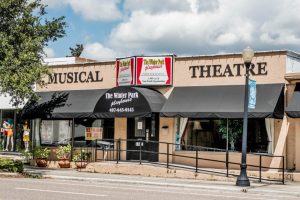
Winter Park Playhouse
The bulk of the hotel tax goes toward paying off the construction costs and operating the Orange County Convention Center, other large venues and Visit Orlando, the publicly-supported organization that markets Orlando as a destination.
The convention center’s operating expenses exceed its revenue so far this year by $12.6 million, according to the comptroller’s report at the Sept. 27 meeting. The subsidy paid by the county out of tourist tax dollars to keep the convention center operating in the black is tracking higher this year than the previous two years, the report showed.
In all, 14 groups originally applied for the arts money with requests totalling $126 million.
Three groups were deemed ineligible for the funds, leaving 11 groups with requests totalling $94.2 million — nearly $20 million more than the allotted $75 million budget for the projects.
A committee led by former Orange County Comptroller Martha Haynie met to rank the projects and recommend how much each would receive.
The Tourist Tax Council, which includes Orange Mayor Jerry Demings, Orlando Mayor Buddy Dyer, Eatonville Mayor Angie Gardner, four hotel owners or industry representatives who must remit the tax and two others, accepted those recommendations at its meeting last week.
Haynie urged the board to reconsider the criteria for future local arts projects to put less emphasis on driving overnight hotel stays — a move that she said could help demonstrate how the tax is used to benefit local residents vs. the tourism industry.
“I think when the Board of County Commissioners can demonstrate the interest and the support of local cultural organizations it supports the position county has always taken,” to reserve the bulk of the tax for industry projects amid pressure to expand how the tax is used, Haynie said. She noted that expanding uses of the tax “in the long run probably would not serve the county as well as it has been served today.”
Intensified calls to use some of the hotel tax revenue on local projects such as roads or train lines are playing out in three county commission races on next month’s ballot. That is especially the case in District 5, which represents Winter Park, where former Mayor Steve Leary is receiving financial contributions from the tourism industry against Kelly Semrad, a UCF professor who studies tourism economies, and is calling for the tax to more substantially benefit people who live in Orange County.
Demings focused his comments on the “financial readiness” of some of the organizations who requested money.
“We have had some challenges like the Pulse Museum and others when they don’t execute the fundraising to cover the gap to do the project and then the project gets extended and the price escalates and then they come back and request additional money,” Demings said, though he said he was pleased to see geographic diversity in the list which touched on Winter Park, Winter Garden and Apopka. “The list looks pretty good, but I still remain somewhat concerned about the ability of these organizations to cover the gap … so we’ll see where this ends up.”
Haynie’s committee recommended all but three organizations receive the amount of funding they requested. The recommendations to be considered by the County Commission later this month are:
- City of Apopka: $13.1 million to construct and improve softball fields, the amphitheater and other facilities. Estimated total cost of the project is $13.3 million.
- 4R Foundation: $12 million for a community events center plus and outdoor stage and lawn at 4Roots Campus, which also includes a farm and classroom space in Orlando’s Packing District neighborhood. Estimated total cost of the project is $65 million.
- Orlando Science Center: $13.9 million enlarge and remodel the outdoor terrace and event venue. Estimated total cost of the project is $14.1 million.
- Rollins College: $10 million to construct a new art museum for new art museum. Estimated total project cost is $30.6 million.
- Orlando Philharmonic Plaza Foundation: $2.1 million to improve the auditorium, including a patron’s room. Estimated total project cost is $3.1 million.
- Winter Garden Art Association: $4 million for a new museum next to the current space. Estimated total cost of the project is $7 million.
- Orlando Family Stage: $5.8 million to remodel and operate the auditorium. Estimated total project cost is $7.6 million.
- City of Winter Park : $8 million to acquire, enlarge and remodel the Winter Park Playhouse. Estimated cost of the total project is $10 million.
- Friends of the Mennello: $2 million (request was $13 million) to enlarge and improve the folk art museum. Estimated total cost is $30 million.
- Orlando Museum of Art: $2 million (request was $7.2 million) to repair the roof and HVAC system. Total cost of the project is estimated at $7.5 million.
- PAST/Wells’ Built Museum: $2 million (request was $5 million) to acquire the property and construct and improve the museum and auditorium. Estimated total cost is $10 million.
WinterParkVoiceEditor@gmail.com
To comment or read comments from others, click here →
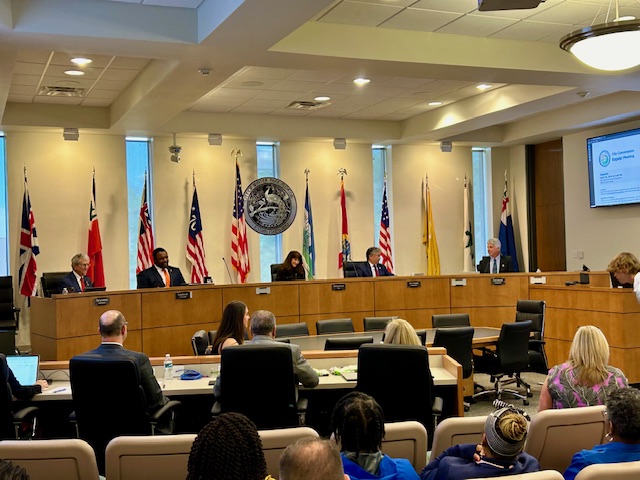
by Beth Kassab | Oct 1, 2024 | City Commission, Election, News, Uncategorized
Kris Cruzada to seek reelection, but Todd Weaver decides not to run
Two City Commission seats are up for grabs in the March election — one political newcomer has already filed
Oct. 1, 2024
By Beth Kassab
Kris Cruzada will seek a second term in Seat 3 on the City Commission while Todd Weaver has opted out of running again for Seat 4 ahead of the March 11 election.
Warren Lindsey, a well-known criminal defense attorney who has lived in Winter Park for 30 years, has filed to run for the seat left open by Weaver’s decision.
Lindsey is a first-time candidate for office and currently serves on the city’s Planning & Zoning Board.
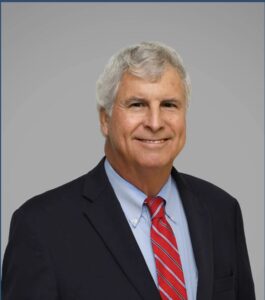
Warren Lindsey
That experience, he said, led to a desire to get more involved in city government.
“It’s wonderful — you really see democracy in action,” Lindsey said. “People from all walks of life come up to the podium.”
If elected, Lindsey said his priorities will be keeping taxes low (Winter Park has the second lowest millage rate among local cities) while preserving the quality of city services, including the police and fire departments.
He’s also interested in economic development and improving the health of the Winter Park Chain of Lakes.
Lindsey, who graduated from Stetson University and the University of Florida law school, practices at Lindsey, Ferry & Parker and previously practiced with Chandler Muller and Kirk Kirkconnell, who both died from cancer in 2012. The Winter Park group was known for taking on some of the highest profile criminal cases in the state.
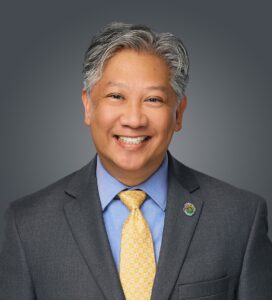
Kris Cruzada
Weaver, an engineer who was first elected in 2019, said his professional responsibilities are taking more of his time so he decided against seeking a third term.
Cruzada, an attorney first elected in 2022, said he wants to continue initiatives he started in his first term such as working with his fellow commissioners to shore up the city’s aging infrastructure, including roads and flood prevention measures. He also wants to continue to make the building code more predictable so that landowners have more clarity over how they can develop their property.
“I want to continue on the path of what I set out to do,” said Cruzada, a lifelong resident of the area.
He graduated from the University of Central Florida and earned a law degree from St. Louis University. Today he practices family and personal injury law and works for his family’s property holdings company.

Todd Weaver
Candidates looking to enter one of the city races must qualify by Jan. 21. They are elected to three-year terms and can serve a maximum of four terms or 12 years on the board.
The March 11 ballot will also include a referendum asking voters whether or not the city should keep in place its ban on gas-powered leaf blowers to help regulate noise and emissions. The current ban, originally passed in 2022, is not yet being enforced after a controversy erupted earlier this year when landscape companies argued the rule imposed too heavy of a financial burden.
WinterParkVoiceEditor@gmail.com
To comment or read comments from others, click here →
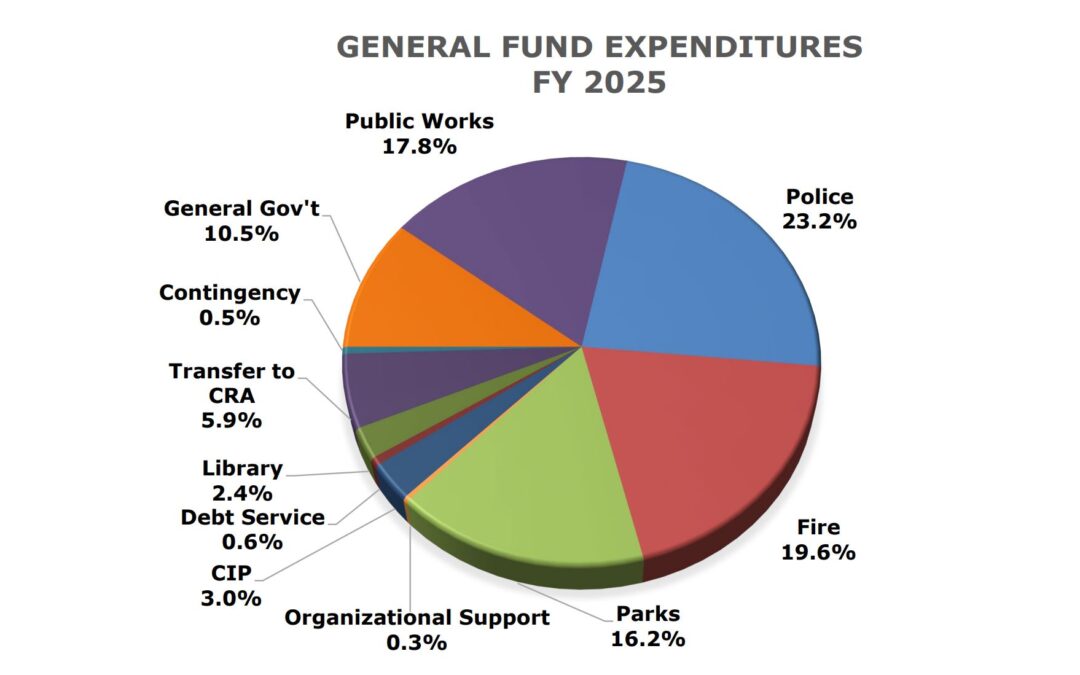
by Beth Kassab | Sep 13, 2024 | City Commission, News, Taxes, Uncategorized
Winter Park approves new $214.6 million budget for 2025
The budget includes more dollars for infrastructure projects, public safety positions and local nonprofit organizations
September 13, 2024
By Beth Kassab
Winter Park’s city budget will grow to $214.6 million for 2025, a 3% increase from the current year driven by an increase in property tax revenue, higher fees paid by residents for stormwater projects and garbage collection along with sales tax revenue passed along by the state.
The City Commission voted 4-0 to approve the budget this week (Commissioner Marty Sullivan was absent from the meeting). Final approval of the spending plan is scheduled for Sept. 25.
The extra $6 million in the new budget will largely go to pay for new positions in the police and fire departments as well as public works projects for roads and other infrastructure.
Commissioners kept the city’s tax rate the same at 4.3302 mils, but higher home values drove property tax collections up by more than 8%.
Residents will also feel the impact from rising fees built into their water, sewer and garbage collection bills as well as the stormwater fee, which is collected as part of the annual property tax bill.
The higher fees account for an additional $3 million in the budget. The average customer will pay about $13 more per month or an extra $156 per year as a result of the rising rates, according to city budget documents.
Garbage collections skyrocketed as part of a new contract with Waste Management, the private contractor for the city.
The stormwater fees are rising as part of a three-year plan to raise rates to about 9 cents per square foot of what the city calls impervious surface (generally the amount of concrete covering a lot). The goal is to raise $2.7 million each year for flood prevention and to improve lake quality.
Commissioners will hold a work session later this month to discuss findings from a series of basin studies that are expected to identify stormwater improvements needed to manage flooding. The studies were ordered last year and are expected to be finalized in October, a city spokeswoman said.
Commissioners also approved an increase in the dollars they give to local nonprofit organizations.
For the first time in 10-years, the city will not provide $100,000 to the Dr. Phillips Center for the Performing Arts after it’s funding agreement ended. Those dollars along with an increase in total support from $2.3 million this year to $2.4 million mean two new groups will receive funding along with increases for the nonprofits already funded by the city.
Organizations receiving support include:
- Mead Botanical Gardens: $98,000, a $4,500 increase.
- Winter Park Historical Association: $93,000, a $5,000 increase.
- Winter Park Day Nursery: $41,000, a $2,500 increase.
- United Arts: $19,000, a $600 increase.
- Blue Bamboo: $12,000, a $1,000 increase.
- Polasek Museum: $27,000, a $1,700 increase.
- Winter Park Library: $2,028,600, a $96,600 increase
- Winter Park Institute: $25,000, newly added this year.
- Men of Integrity: $18,000, newly added this year.
The city’s Community Redevelopment Agency, which is up for an extension and expansion from the Orange County Commission, will provide the following additional aid:
- Enzian Theater: $10,000, no change.
- Heritage Center: $50,000, no change.
- Welbourne Day Nursery: $41,000, a $2,500 increase.
- Winter Park Playhouse: $47,000, a $3,000 increase.
- Depugh Nursing Home: $23,000, a $1,000 increase.
- Winter Park Library: $368,000, an $18,000 increase.
The city’s reserve fund is expected to reach $21.2 million or about 27% of recurring annual operating costs in the General Fund, according to the city budget proposal. The percentage is decreasing because new expenditures are outpacing growth in revenue, according to the document.
Highlights of expenditures include:
•Spending on capital projects will remain stable at $25.6 million, mostly for undergrounding power lines and investments in stormwater.
• Four new public safety positions including two more firefighters/EMTs, a fire logistics manager and a full-time police grant and accreditation manager.
WinterParkVoiceEditor@gmail.com
To comment or read comments from others, click here →
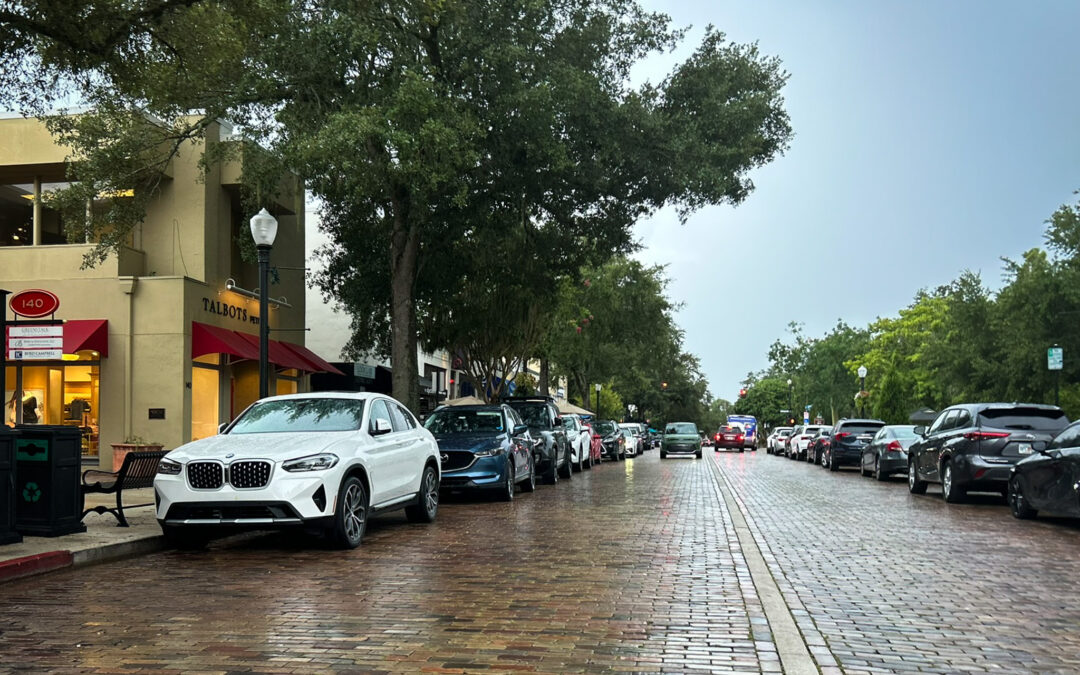
by Beth Kassab | Sep 3, 2024 | City Commission, News, Uncategorized, Zoning and Development
Developers could catch a break on parking rules if changes approved
The P&Z board will tonight hold the first hearing on changes designed to avoid large, mostly empty lots
Sept. 3, 2024
By Beth Kassab
Developers could soon face less strict parking requirements in Winter Park if recommended changes are approved to reduce the number of spaces required for shops, offices and apartments.
The Planning & Zoning Board will hear the proposal for the first time on Tuesday night at 6 p.m.
Last year the Winter Park Chamber of Commerce brought in the author of “Paved Paradise: How Parking Explains the World” to advocate for loosening the number of required spaces for new development.
Henry Grabar argues that all over America, cities are underhoused and overparked. Valuable real estate is taken up by too many unused parking spaces. And that, he says, drives up the cost of construction and pushes sprawl.
Onerous parking codes also offer a way for residents to oppose new affordable or denser housing projects.
“Badmouthing the poor was a little unseemly,” he wrote. “But complaining about parking was morally unimpeachable.”
In fact, parking became a focus in the recent debate over Rollins’ proposal to build 30 units that it plans to rent below market rate to its faculty and staff. The City Commission approved the project last week, ultimately, with a compromised parking arrangement and a pledge from Rollins to give over some land for more on-street parking.
The parking standards used in that project are aligned with the proposed changes from city staff.
Among the proposed changes outlined in the memorandum:
- Unify the parking code requirement for non-medical office and retail city-wide to one space per 333 square feet versus the current rule of one space per 250 square feet. According to the staff report, the standard is already one space for 333 square feet in the Central Business District, the Hannibal Square neighborhood and the Orange Avenue Overlay. This is a 25% decrease in parking required for retail or non-medical office.
- Reduce parking at large office buildings, which have the largest parking surpluses, according to the report. Combined with the change above this would further reduce the parking requirements to one space per 400 square feet for any building larger than 15,000 square feet. “For example, a 30,000 square foot office building now needs 120 parking spaces,” the staff report explained. “With the two changes together (1 per 333 for the first 15,000 square feet and 1 per 400 for next 15,000 square feet), the parking required is 83 spaces. This is a 30% reduction in required parking.”
- For apartments of three or more units, the standards would be 1.25 spaces for a one-bedroom unit; 2 spaces for a two-bedroom unit and 2.5 spaces for a three-bedroom unit. This is the same standard that exists now for properties within the Orange Avenue Overlay. For townhouse and condo projects with larger units, the current rule would remain of 2.5 spaces if the unit is larger than 2,000 square feet.
- The maximum parking provision could be no more than 150% of the code requirement.
During the discussion about the Rollins faculty apartments, some commissioners indicated they may not be on board with the changes.
Commissioner Todd Weaver, who voted against the project, said he would “never vote for decreasing parking in our downtown because there’s no mass transit.”
That has been a key criticism of Grabar’s philosophy — that not every city has the local buses, shuttles or other options in place to wean residents off of their dependence on cars.
Winter Park boasts one of the most successful SunRail stops on the commuter rail’s line, but rail system along with the Lynx bus system lack a regional dedicated funding source to keep up with demand.
The city staff report, however, argues there are reasons unrelated to the transportation debate to reduce parking requirements, especially among office buildings.
“Office floor plans have evolved over the years with larger offices, fewer open-air cubicles and more amenity space,” the report said. “Additionally, the nature of most office businesses has changed so that fewer clients need to visit with the use of email and electronic communication. It also is prudent to have a unified city-wide parking rate for office and retail versus different geographic parking rates, thus the proposal for one per 333 square feet city-wide.”
WinterParkVoiceEditor@gmail.com
To comment or read comments from others, click here →
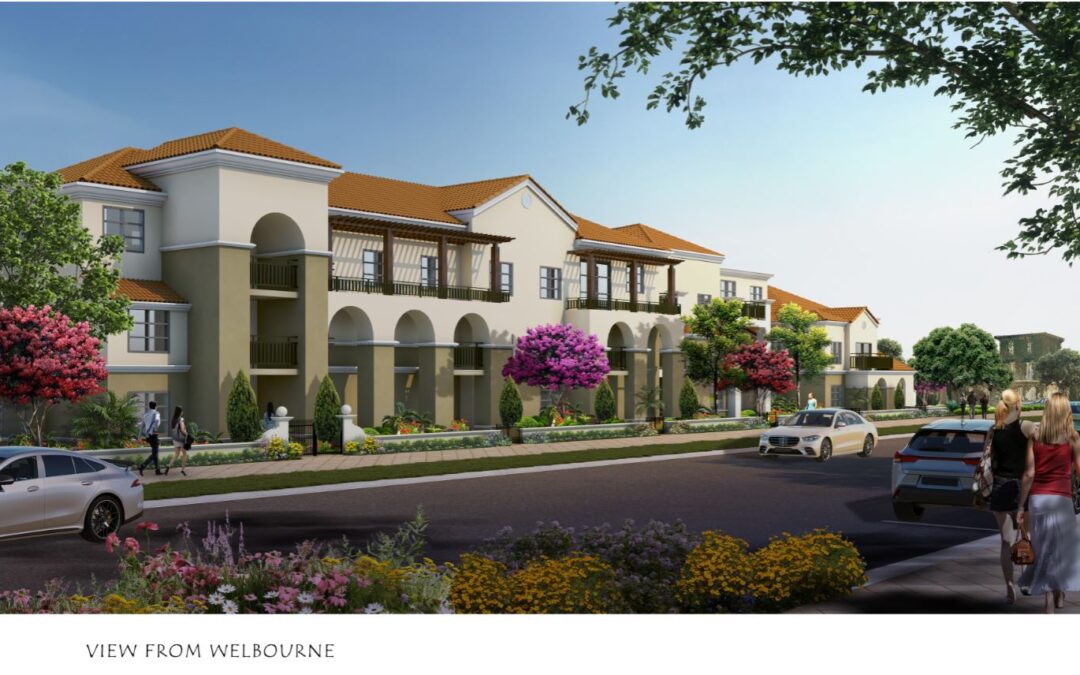
by Beth Kassab | Aug 23, 2024 | City Commission, News, Uncategorized, Zoning and Development
Rollins proposes payment equivalent to some taxes on faculty apartments
The liberal arts college is often exempt from property taxes as a nonprofit educational institution. The agreement now before the City Commission would be a first for the city.
Aug. 23, 2024
By Beth Kassab
In a first-of-a-kind deal for Winter Park, Rollins College is proposing it pay a fee equal to a portion of the city property taxes it would owe on a faculty housing project up for City Commission approval next week.
The potential agreement comes after months of back-and-forth with city officials and residents over the liberal arts college first unveiled plans to build 48 apartments on land it already owns at Welbourne and Virginia avenues.
College administrators say the apartments, which would be rented to faculty and staff below market rate, will serve as a recruiting tool for early-career professors who would otherwise likely live much farther from campus as a result of the high cost of rent in Winter Park, where homes routinely sell for more than $1 million.
But criticism over the architecture of the project, lack of commercial space on a portion that once fronted New England Avenue, parking concerns and the college’s typical exemption from property taxes contributed to major revisions of the plans.
The project now contains 30 units vs. 48, a pocket park, additional parking and no longer includes a building fronting New England Avenue.
In what appears to be an effort to satisfy calls from the Planning & Zoning Board to contribute to funds for city services, the college says it will enter into a Payment in Lieu of Taxes or PILOT agreement with Winter Park if the typical exemption for nonprofit educational institutions is granted on the land.
The payment would equal about 50% of the taxes owed to the city or about 2 mills. Rollins estimated the payment at between $18,000 to $20,000 a year, though an exact figure won’t be available until it is built and assessessed by the Orange County Property Appraiser.
“The PILOT payment is intended to offset the costs of emergency services for the multi-unit residential project,” the college said in the language it submitted to the city.
“Currently, we have 14 units on the site, and we pay no taxes,” said college spokeswoman Jo Marie Hebeler. “So this is a significant commitment and contribution from Rollins.”
Rollins uses an older building on the site for graduate student housing, but that would be torn down as part of the new project.
The private college, known for its lakefront Spanish-Mediterranean campus and tuition and fees totaling more than $76,000 a year, had resisted such an agreement in previous meeting, citing what it said was already significant contributions toward city services such as allowing the police and fire departments to use old buildings for training and argued such a deal would set a bad precedent.
Much of Rollins’ property holdings in the city are exempt from the tax rolls and some residents have voiced concerns that the college is growing too far outside of its main campus and should contribute more toward the cost of development.
The college does pay taxes on some of its land that doesn’t qualify as exempt such as on The Alfond Inn, a luxury hotel it runs as a for-profit business. The college owes $767,000 in taxes this year on the inn, which is assessed at nearly $50 million, according to property appraiser records.
Jeff Briggs, the city’s longtime planning director, said this is the first time a nonprofit group has reached a PILOT agreement with the city. The deal will likely be closely watched by other nonprofits across the region including hospitals such as AdventHealth and Orlando Health and other colleges and universities.
The City Commission will take up the project at its meeting on Wednesday, Aug. 28.
WinterParkVoiceEditor@gmail.com
To comment or read comments from others, click here →












Recent Comments